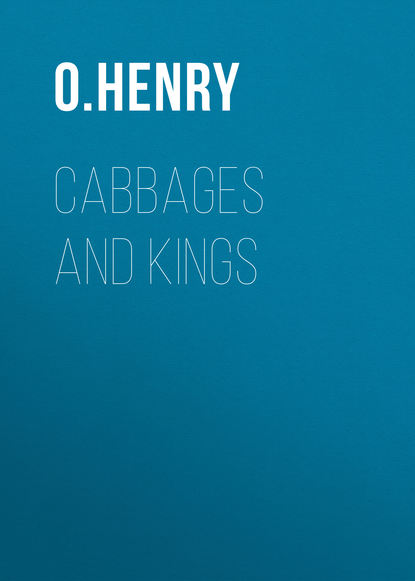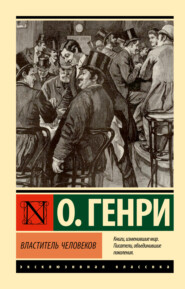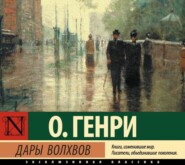По всем вопросам обращайтесь на: info@litportal.ru
(©) 2003-2025.
✖
Cabbages and Kings
Настройки чтения
Размер шрифта
Высота строк
Поля
A look of supreme, almost incredulous, delight dawned in Keogh's ruddy countenance. He dropped his pencil. His eyes turned upon the sunburned young man with joy in them mingled with fear lest his ecstasy should prove a dream.
"For God's sake, tell me," said Keogh, earnestly, "are you Dink Pawson?"
"My name is Pinkney Dawson," said the cornerer of the cockleburr market.
Billy Keogh slid rapturously and gently from his chair to his favourite strip of matting on the floor.
There were not many sounds in Coralio on that sultry afternoon. Among those that were may be mentioned a noise of enraptured and unrighteous laughter from a prostrate Irish-American, while a sunburned young man, with a shrewd eye, looked on him with wonder and amazement. Also the "tramp, tramp, tramp" of many well-shod feet in the streets outside. Also the lonesome wash of the waves that beat along the historic shores of the Spanish Main.
XIV
MASTERS OF ARTS
A two-inch stub of a blue pencil was the wand with which Keogh performed the preliminary acts of his magic. So, with this he covered paper with diagrams and figures while he waited for the United States of America to send down to Coralio a successor to Atwood, resigned.
The new scheme that his mind had conceived, his stout heart indorsed, and his blue pencil corroborated, was laid around the characteristics and human frailties of the new president of Anchuria. These characteristics, and the situation out of which Keogh hoped to wrest a golden tribute, deserve chronicling contributive to the clear order of events.
President Losada – many called him Dictator – was a man whose genius would have made him conspicuous even among Anglo-Saxons, had not that genius been intermixed with other traits that were petty and subversive. He had some of the lofty patriotism of Washington (the man he most admired), the force of Napoleon, and much of the wisdom of the sages. These characteristics might have justified him in the assumption of the title of "The Illustrious Liberator," had they not been accompanied by a stupendous and amazing vanity that kept him in the less worthy ranks of the dictators.
Yet he did his country great service. With a mighty grasp he shook it nearly free from the shackles of ignorance and sloth and the vermin that fed upon it, and all but made it a power in the council of nations. He established schools and hospitals, built roads, bridges, railroads and palaces, and bestowed generous subsidies upon the arts and sciences. He was the absolute despot and the idol of his people. The wealth of the country poured into his hands. Other presidents had been rapacious without reason. Losada amassed enormous wealth, but his people had their share of the benefits.
The joint in his armour was his insatiate passion for monuments and tokens commemorating his glory. In every town he caused to be erected statues of himself bearing legends in praise of his greatness. In the walls of every public edifice, tablets were fixed reciting his splendour and the gratitude of his subjects. His statuettes and portraits were scattered throughout the land in every house and hut. One of the sycophants in his court painted him as St. John, with a halo and a train of attendants in full uniform. Losada saw nothing incongruous in this picture, and had it hung in a church in the capital. He ordered from a French sculptor a marble group including himself with Napoleon, Alexander the Great, and one or two others whom he deemed worthy of the honour.
He ransacked Europe for decorations, employing policy, money and intrigue to cajole the orders he coveted from kings and rulers. On state occasions his breast was covered from shoulder to shoulder with crosses, stars, golden roses, medals and ribbons. It was said that the man who could contrive for him a new decoration, or invent some new method of extolling his greatness, might plunge a hand deep into the treasury.
This was the man upon whom Billy Keogh had his eye. The gentle buccaneer had observed the rain of favors that fell upon those who ministered to the president's vanities, and he did not deem it his duty to hoist his umbrella against the scattering drops of liquid fortune.
In a few weeks the new consul arrived, releasing Keogh from his temporary duties. He was a young man fresh from college, who lived for botany alone. The consulate at Coralio gave him the opportunity to study tropical flora. He wore smoked glasses, and carried a green umbrella. He filled the cool, back porch of the consulate with plants and specimens so that space for a bottle and chair was not to be found. Keogh gazed on him sadly, but without rancour, and began to pack his gripsack. For his new plot against stagnation along the Spanish Main required of him a voyage overseas.
Soon came the Karlsefin again – she of the trampish habits – gleaning a cargo of cocoanuts for a speculative descent upon the New York market. Keogh was booked for a passage on the return trip.
"Yes, I'm going to New York," he explained to the group of his countrymen that had gathered on the beach to see him off. "But I'll be back before you miss me. I've undertaken the art education of this piebald country, and I'm not the man to desert it while it's in the early throes of tintypes."
With this mysterious declaration of his intentions Keogh boarded the Karlsefin.
Ten days later, shivering, with the collar of his thin coat turned high, he burst into the studio of Carolus White at the top of a tall building in Tenth Street, New York City.
Carolus White was smoking a cigarette and frying sausages over an oil stove. He was only twenty-three, and had noble theories about art.
"Billy Keogh!" exclaimed White, extending the hand that was not busy with the frying pan. "From what part of the uncivilized world, I wonder!"
"Hello, Carry," said Keogh, dragging forward a stool, and holding his fingers close to the stove. "I'm glad I found you so soon. I've been looking for you all day in the directories and art galleries. The free-lunch man on the corner told me where you were, quick. I was sure you'd be painting pictures yet."
Keogh glanced about the studio with the shrewd eye of a connoisseur in business.
"Yes, you can do it," he declared, with many gentle nods of his head. "That big one in the corner with the angels and green clouds and band-wagon is just the sort of thing we want. What would you call that, Carry – scene from Coney Island, ain't it?"
"That," said White, "I had intended to call 'The Translation of Elijah,' but you may be nearer right than I am."
"Name doesn't matter," said Keogh, largely; "it's the frame and the varieties of paint that does the trick. Now, I can tell you in a minute what I want. I've come on a little voyage of two thousand miles to take you in with me on a scheme. I thought of you as soon as the scheme showed itself to me. How would you like to go back with me and paint a picture? Ninety days for the trip, and five thousand dollars for the job."
"Cereal food or hair-tonic posters?" asked White.
"It isn't an ad."
"What kind of a picture is it to be?"
"It's a long story," said Keogh.
"Go ahead with it. If you don't mind, while you talk I'll just keep my eye on these sausages. Let 'em get one shade deeper than a Vandyke brown and you spoil 'em."
Keogh explained his project. They were to return to Coralio, where White was to pose as a distinguished American portrait painter who was touring in the tropics as a relaxation from his arduous and remunerative professional labours. It was not an unreasonable hope, even to those who had trod in the beaten paths of business, that an artist with so much prestige might secure a commission to perpetuate upon canvas the lineaments of the president, and secure a share of the pesos that were raining upon the caterers to his weaknesses.
Keogh had set his price at ten thousand dollars. Artists had been paid more for portraits. He and White were to share the expenses of the trip, and divide the possible profits. Thus he laid the scheme before White, whom he had known in the West before one declared for Art and the other became a Bedouin.
Before long the two machinators abandoned the rigour of the bare studio for a snug corner of a café. There they sat far into the night, with old envelopes and Keogh's stub of blue pencil between them.
At twelve o'clock White doubled up in his chair, with his chin on his fist, and shut his eyes at the unbeautiful wall-paper.
"I'll go you, Billy," he said, in the quiet tones of decision. "I've got two or three hundred saved up for sausages and rent; and I'll take the chance with you. Five thousand! It will give me two years in Paris and one in Italy. I'll begin to pack to-morrow."
"You'll begin in ten minutes," said Keogh. "It's to-morrow now. The Karlsefin starts back at four P.M. Come on to your painting shop, and I'll help you."
For five months in the year Coralio is the Newport of Anchuria. Then only does the town possess life. From November to March it is practically the seat of government. The president with his official family sojourns there; and society follows him. The pleasure-loving people make the season one long holiday of amusement and rejoicing. Fiestas, balls, games, sea bathing, processions and small theatres contribute to their enjoyment. The famous Swiss band from the capital plays in the little plaza every evening, while the fourteen carriages and vehicles in the town circle in funereal but complacent procession. Indians from the interior mountains, looking like prehistoric stone idols, come down to peddle their handiwork in the streets. The people throng the narrow ways, a chattering, happy, careless stream of buoyant humanity. Preposterous children rigged out with the shortest of ballet skirts and gilt wings, howl, underfoot, among the effervescent crowds. Especially is the arrival of the presidential party, at the opening of the season, attended with pomp, show and patriotic demonstrations of enthusiasm and delight.
When Keogh and White reached their destination, on the return trip of the Karlsefin, the gay winter season was well begun. As they stepped upon the beach they could hear the band playing in the plaza. The village maidens, with fireflies already fixed in their dark locks, were gliding, barefoot and coy-eyed, along the paths. Dandies in white linen, swinging their canes, were beginning their seductive strolls. The air was full of human essence, of artificial enticement, of coquetry, indolence, pleasure – the man-made sense of existence.
The first two or three days after their arrival were spent in preliminaries. Keogh escorted the artist about town, introducing him to the little circle of English-speaking residents and pulling whatever wires he could to effect the spreading of White's fame as a painter. And then Keogh planned a more spectacular demonstration of the idea he wished to keep before the public.
He and White engaged rooms in the Hotel de los Estranjeros. The two were clad in new suits of immaculate duck, with American straw hats, and carried canes of remarkable uniqueness and inutility. Few caballeros in Coralio – even the gorgeously uniformed officers of the Anchurian army – were as conspicuous for ease and elegance of demeanour as Keogh and his friend, the great American painter, Señor White.
White set up his easel on the beach and made striking sketches of the mountain and sea views. The native population formed at his rear in a vast, chattering semicircle to watch his work. Keogh, with his care for details, had arranged for himself a pose which he carried out with fidelity. His rôle was that of friend to the great artist, a man of affairs and leisure. The visible emblem of his position was a pocket camera.
"For branding the man who owns it," said he, "a genteel dilettante with a bank account and an easy conscience, a steam-yacht ain't in it with a camera. You see a man doing nothing but loafing around making snap-shots, and you know right away he reads up well in 'Bradstreet.' You notice these old millionaire boys – soon as they get through taking everything else in sight they go to taking photographs. People are more impressed by a kodak than they are by a title or a four-carat scarf-pin." So Keogh strolled blandly about Coralio, snapping the scenery and the shrinking señoritas, while White posed conspicuously in the higher regions of art.
Two weeks after their arrival, the scheme began to bear fruit. An aide-de-camp of the president drove to the hotel in a dashing victoria. The president desired that Señor White come to the Casa Morena for an informal interview.
Keogh gripped his pipe tightly between his teeth. "Not a cent less than ten thousand," he said to the artist – "remember the price. And in gold or its equivalent – don't let him stick you with this bargain-counter stuff they call money here."
"Perhaps it isn't that he wants," said White.
"Get out!" said Keogh, with splendid confidence. "I know what he wants. He wants his picture painted by the celebrated young American painter and filibuster now sojourning in his down-trodden country. Off you go."
The victoria sped away with the artist. Keogh walked up and down, puffing great clouds of smoke from his pipe, and waited. In an hour the victoria swept again to the door of the hotel, deposited White, and vanished. The artist dashed up the stairs, three at a step. Keogh stopped smoking, and became a silent interrogation point.
"Landed," exclaimed White, with his boyish face flushed with elation. "Billy, you are a wonder. He wants a picture. I'll tell you all about it. By Heavens! that dictator chap is a corker! He's a dictator clear down to his finger-ends. He's a kind of combination of Julius Cæsar, Lucifer and Chauncey Depew done in sepia. Polite and grim – that's his way. The room I saw him in was about ten acres big, and looked like a Mississippi steamboat with its gilding and mirrors and white paint. He talks English better than I can ever hope to. The matter of the price came up. I mentioned ten thousand. I expected him to call the guard and have me taken out and shot. He didn't move an eyelash. He just waved one of his chestnut hands in a careless way, and said, 'Whatever you say.' I am to go back to-morrow and discuss with him the details of the picture."
Keogh hung his head. Self-abasement was easy to read in his downcast countenance.

















